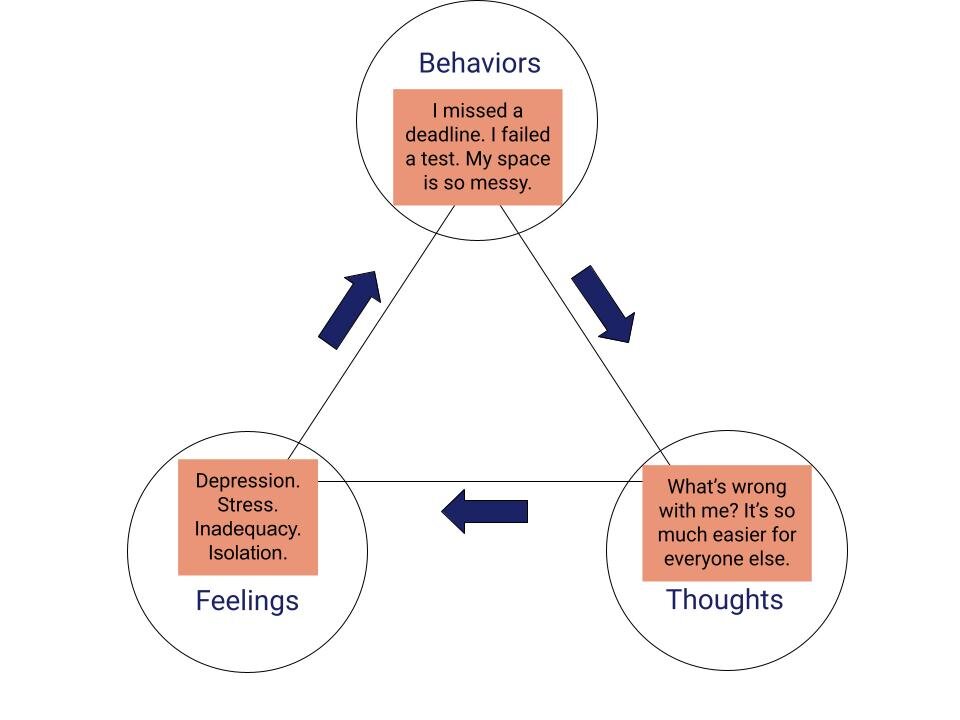Our unique methodology,
Executive Functioning Cognitive Training (EFCT)
allows us to unlock motivational challenges and
create the strategies needed to affect change.
Why do we procrastinate? Why do we have inconsistent bursts of productivity? Why can’t we rest without guilt?
It can be a vicious cycle we know all too well. We have too many tasks to juggle. Deadlines to meet. Feel disorganized. We know that we should just do the work, run the errand, answer the email, but it’s so hard.
We buy planners and organizing tools, but they don’t stick or address the larger issues surrounding our inconsistent motivation. Understanding what props up and depletes motivation is a critical puzzle piece for people with low Executive Functioning.
EFCT is a methodology that unpacks and resolves issues surrounding motivation.
EFCT recognizes that there are three primary factors that either prop up or deplete our motivation:
Value metrics (understanding the why behind our tasks and responsibilities)
Environment (creating strategies around how we approach our tasks and responsibilities)
Thoughts & Feelings (recognizing the ways our mental health impacts our ability to engage with our tasks and responsibilities)
During our work together, we will address each of these components in tandem in order to ignite consistent motivation, reduce avoidance, procrastination, and most importantly anxiety and overwhelm.
EFCT incorporates aspects of CBT and applies it to reduce Executive Functioning challenges.
When we fall behind, miss deadlines, and are disorganized, it can be shaming. The more we experience these negative feelings, the harder it is to engage and be motivated.
That’s because there is a connection between the ways that we behave and the ways that we think and feel about ourselves.
As articulated in a Cognitive Behavioral Therapy (CBT) approach, the ways we think and feel (I’m capable, I’m incapable, etc) -> affects our behavior (our ability to execute and function strategically and with confidence).
Additionally, our behavior (missing a deadline, forgetting our work at home, avoiding, etc) -> affects how we feel and think about ourselves (What’s wrong with me? Why is it easier for everyone else? etc).
By helping develop strong Executive Functioning strategies & skills, we reroute the cycle entirely.
There are many ways that our philosophy aligns with the core tenets of CBT. Here are the most fundamental:
Thoughts, feelings, and behaviors are mutually reinforcing.
What we do and how we do it can mitigate negative thoughts and feelings.
Breaking down big challenges into smaller more manageable pieces can increase self esteem and motivation.
When we are unsure about the outcome of a situation (a test score, a presentation, etc.) we are likely to suffer from anticipatory anxiety, panic, worry, and stress that threatens motivation and ultimately engagement.
Breaking down the habit of negative thinking through goal setting can make it easier to be more active. And, in turn, greater engagement makes it easier to identify clear goals and increases the ability to feel successful.
So is Executive Functioning support a replacement for therapy?
The simple answer is no. But they are related.
People whose negative feelings and thoughts exceed healthy measures should be treated by therapist or mental health professional. But when we are able to execute and functioning consistently and strategically (behavior), anxiety subsides and confidence increases.
Behavior, thoughts, and feelings are connected. Our goal is to reduce anxiety and shame through greater Executive Functioning.





